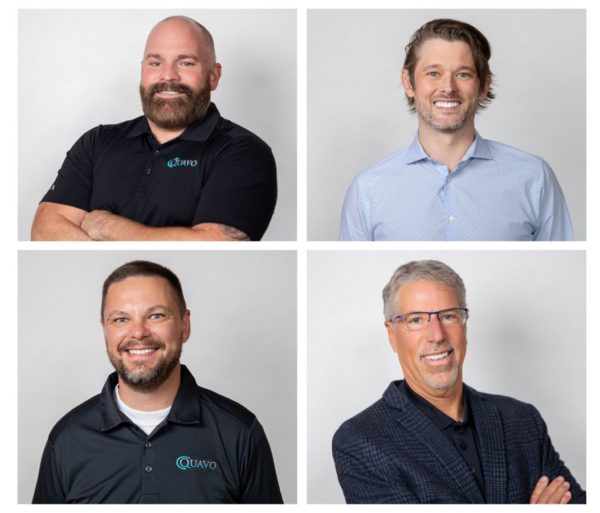
This editorial article is a part of Software Trends Month 2022 of Technical.ly's editorial calendar. This month’s theme is underwritten by Spotify. This story was independently reported and not reviewed by Spotify before publication.
There are millions of bank accounts spread across countless financial institutions, and back then, the large majority of those institutions were dealing with in-house tools to fight fraud and disputes.
“We saw an opportunity in the market to build a standard solution, so they wouldn’t all have to start from scratch,” explained Joseph McLean, a former banking VP. “There’s only so many ways to solve this problem. Let’s solve it once, and for everyone.”
So McLean and fellow cofounders Daniel Penne, Richard Jefferson and David Chmielewski began building Quavo in 2016, and at the time, neither they nor their clients were interested in the cloud. Their first client — a credit union in Mountain View, California — got its product installed on-premises.
And the Quavo team wasn’t super interested in SaaS, either; they wanted to be a product with recurring revenue, Penne said. It took them a while to even consider themselves a product company, he added.
“Back then, institutions didn’t just not like the cloud, they refused to do it,” Penne told Technical.ly. “Everyone was anti-having their data not on their own server.”
But as they added clients and grew their company, the fintech landscape changed. They “piggybacked” off other cloud services for a little while, and in December 2020, sold fraud and dispute software for the first time built on AWS. And they never looked back.
Once they moved one client to the cloud-based SaaS product, the others followed in quick succession. It was almost like they were holding their breath, waiting for someone to take the first plunge, the founders said.
“Obviously the market is changing, and people were more open, but when we said, ‘we have one person on SaaS,’ we got very little pushback ever,” Penne said. “It was almost like a chicken switch, no one was live on it or wanted to touch it, and then one person did it, and we said, ‘this is how we’re going to offer this from now on.'”
McLean said the switch has offered the company a lot of advantages. They’ve since been working on what they call IP Capture, hearing suggestions of things that worked for clients or wish-list items that engineers then apply to the product across all clients. They’ve also been able to offer implementations at no cost, McLean said. Instead of spending three years and millions to make a feature go live, the company can get features live in a matter of months.
“It’s because it’s SaaS, and we’re operating with those standards and best practices,” McLean said. “It’s been a game changer for us.”
The company has some Philly and Wilmington roots — McLean, the CEO, is in Delaware and Penne, the CFO, is a Philly native who recently moved to Florida. But the pandemic has made them further embrace a distributed team and workflow. COO Chmielewski works from Michigan where they set up an office to help recruit Michigan State University graduates, and Jefferson, the EVP, works from New Hampshire. The company has about seven Philly-based and Delaware based employees, but its team of 83 is spread across 13 states, the cofounders said.
And a $6 million Series A that the company closed in October of last year will go toward the “support structure” around their SaaS product.
“Our product is generally solid,” Penne said. “But now we’re looking at marketing it, scaling support. Who is going to sell it? For so long we were focused on getting it viable and out there, and now is the time we have this great product to sell.”
Join the conversation!
Find news, events, jobs and people who share your interests on Technical.ly's open community Slack

Delaware daily roundup: Delmarva Power vendor stats; DelDOT's $15M federal grant; 50 best companies to work for

Delaware daily roundup: Over 4,000 Black-owned businesses uncovered; Dover makes rising cities list; a push for online sports betting

Philly daily roundup: East Market coworking; Temple's $2.5M engineering donation; WITS spring summit


